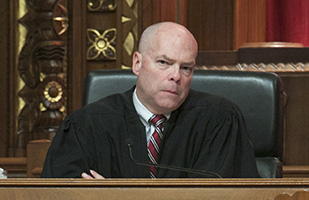Judge Baldwin Substitutes for Recused Justice on Ohio Supreme Court

Fifth District Court of Appeals Judge Craig R. Baldwin

Fifth District Court of Appeals Judge Craig R. Baldwin
Fifth District Court of Appeals Judge Craig R. Baldwin served as a visiting judge on the Ohio Supreme Court on Tuesday and heard oral arguments in a case concerning red-light cameras.
Judge Baldwin substituted for Justice Terrence O’Donnell, who recused himself from Dayton v. State (Case No. 2015-1549). The case involves recent legislation regulating the use of traffic cameras statewide that cities claim infringe on their right to govern.
He joined Chief Justice Maureen O’Connor and Justices Sharon L. Kennedy, Judith L. French, William M. O’Neill, Patrick F. Fischer, and R. Patrick DeWine in hearing the third of three cases on the docket.
This was Judge Baldwin’s first time hearing oral argument as a visiting judge on the Supreme Court and his second visiting judge assignment. According to the Ohio Constitution, in the event of a recusal by a justice, the chief justice can select any of the 69 sitting Ohio appellate court judges to sit temporarily on the Supreme Court.
“I appreciate Chief Justice O’Connor giving me the opportunity to serve as a visiting Judge on the Ohio Supreme Court,” Judge Baldwin said. “It is a privilege and honor to serve on the Court.”
Gov. John Kasich appointed Judge Baldwin to the Fifth District in 2013. Subsequently, he won election in 2014 to serve out the remainder of the unexpired term and was re-elected to a full six-year term in 2016. Judge Baldwin received his bachelor’s degree in political science from Ohio University and earned his law degree from Capital University Law School. He is a member of the Newark-Heath Rotary and a board member of the Licking County YMCA and Licking County Memorial Hospital.
The Fifth District serves 15 counties in the central and eastern half of Ohio and hears cases from county, municipal, and common pleas courts as well as original actions in habeas corpus, mandamus, prohibition, procedendo, and quo warranto.


